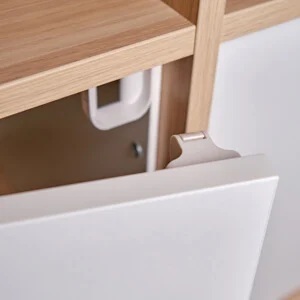Demystifying Magnet Characteristics in Magnetic Latches
May 31st 2023
Listen to this Article
- Magnetic Strength: Magnets' key characteristics in magnetic latches are their magnetic strength or magnetic field intensity. This property determines the force exerted by the magnet, influencing the latch's ability to hold and release doors or access points securely. High-strength magnets, such as neodymium magnets, exhibit powerful magnetic fields, ensuring robust locking mechanisms and resistance to tampering.
- Magnetic Remanence: Magnetic remanence refers to the ability of a magnet to retain its magnetic field even after the external magnetic field is removed. It is an important characteristic for magnetic latches as it ensures that the latch remains in a locked or unlocked position until intentionally acted upon. Magnets with high remanences, like neodymium and samarium cobalt magnets, offer reliable and consistent performance in maintaining the desired state of the latch.
- Temperature Stability: The performance of magnets in magnetic latches can be influenced by temperature variations. Some magnets, such as alnico and samarium cobalt magnets, exhibit excellent temperature stability, retaining their magnetic properties across a wide range of temperatures. This characteristic is crucial for applications where the latches are exposed to extreme temperatures, ensuring consistent functionality and preventing unwanted fluctuations in the locking mechanism.
- Demagnetization Resistance: Demagnetization resistance refers to a magnet's ability to resist the loss of its magnetic properties over time or when subjected to external factors. Magnets used in magnetic latches need to maintain their strength and magnetic field integrity to ensure long-term reliability. Neodymium magnets, for instance, offer high demagnetization resistance, making them an ideal choice for applications where consistent magnetic performance is essential.
- Corrosion Resistance: For magnetic latches installed in outdoor or challenging environments, corrosion resistance is a crucial characteristic. Some magnets, like alnico and ceramic magnets, exhibit good corrosion resistance, ensuring the longevity and durability of the latch. This property helps prevent deterioration and ensures optimal performance, even in harsh or corrosive conditions. If neodymium magnets are desired, specialized coatings like Zinc, Epoxy, or Everlube often offer significant benefits.
By considering these specific magnet characteristics, engineers can select the most suitable magnet type for a given application, optimizing the performance, durability, and security of magnetic latches.
Understanding the intricate details of magnet characteristics empowers us to design and implement magnetic latches that meet the diverse requirements of various industries and access control systems. Let's continue to push the boundaries, innovate, and collaborate to unlock the full potential of magnetic latches and elevate the standards of security and convenience.
May 31st 2023

